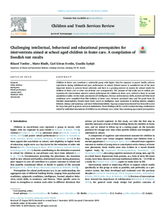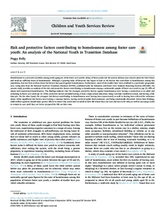Displaying 611 - 620 of 2221
The purpose of this study was to estimate the costs of hospitalization for physical and mental health conditions by child protection status, including out-of-home-care (OOHC) placement, from birth until 13-years, and to assess the excess costs associated with child protection contact over this period.
A number of psychological factors have been found to be relevant in terms of problematic use of digital devices. Some of them may serve as risk factors, while others mean protection. The main goal of present study was to determine user profiles and to examine differences among them based on several psychological variables using cluster analysis.
This study used a dataset of 1426 young adults experiencing homelessness (YAEH) from 7 different US cities to examine the historical risk and resilience characteristics of those involved in foster care alone, juvenile justice alone, both systems (dual status), and no system involvement.
For this study, a sample of youth in foster care was used to provide a new examination of the relation between child maltreatment exposure and internalizing symptoms, to test the possible moderating effects of both appraisals and spirituality, and examine differences between children and adolescents.
The purpose of this study was to outline prerequisites for interventions aimed at school performance for children in foster care, related to those in normal population studies.
This study examined family- and state child welfare system predictors of successful reunification in the United States, or reunification with no reentries into foster care.
The objective of this study was to examine the utility of child protective services data in identifying predictors of placement disruption.
Cross-sectional analysis by the Scottish Government show that the educational outcomes for looked after children are much poorer than for other children in Scotland. This presentation will discuss methods to create a longitudinal data set from these data and thus infer how a child’s lifetime history of care relates to their educational outcomes.
The first aim of this study was to investigate foster children’s social-emotional functioning (externalizing, internalizing and total problem behavior) reported by female and male caregivers, as well as by teachers, at 8 years of age, as compared with a non-foster group. The second aim was to investigate the predictive power of internalizing and externalizing behavior from age 2 and 3 years.
Using data from the U.S. National Youth in Transition Database (NYTD), combined with the Adoption and Foster Care Analysis Reporting System (AFCARS), the present study provides an analysis of the risk and protective factors contributing to homelessness among a nationwide sample of foster care youth at age 21, 29% of whom had experienced homelessness.



